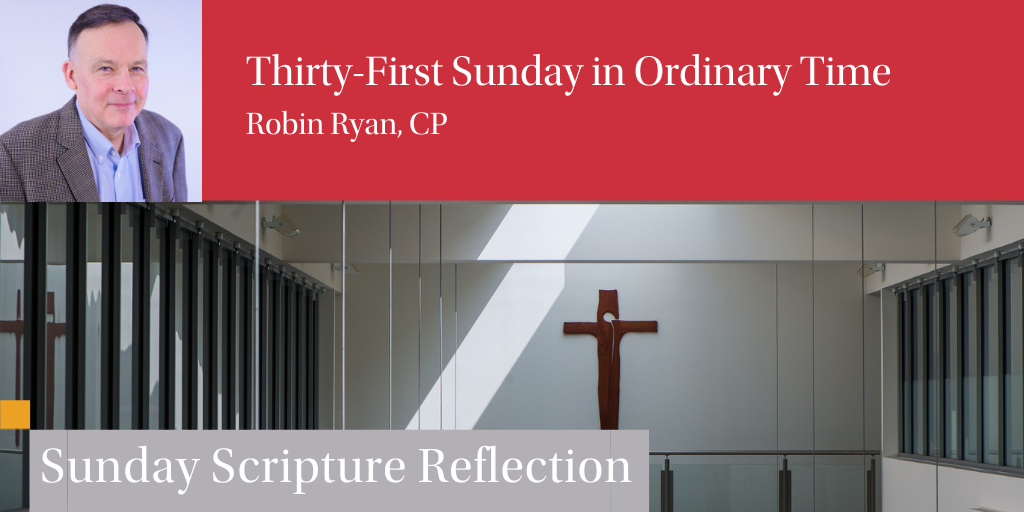
Readings:
Reading I: Wisdom: 11:22-12:2
Psalm 145:1-2, 8-9, 10-11, 13, 14
Reading II: 2 Thessalonians 1:11-2:2
Gospel: Luke 19:1-10
This Sunday’s Gospel story about Zacchaeus and his encounter with Jesus is an endearing and memorable one that has a humorous touch. Every child in religious education class can visualize this vertically challenged man scurrying up the sycamore tree so that he can catch a glimpse of Jesus over the crowds.
Besides being humorous and “homey,” this story is also compelling. It is really a story for adults. It speaks to us about our relationship with the Lord, a relationship that calls for ongoing conversion. In this Gospel passage, we can see three essential dimensions of our life in Christ: the courage to take a risk; the grace of welcome; and the pursuit of justice.
Luke tells us that Zacchaeus, the superintendent of taxes and a wealthy man, was trying to see who Jesus was. Zacchaeus seeks to see, but he does not realize that he is actually being sought after by Jesus (Luke Timothy Johnson). In order to see Jesus, this short man had to take a risk, even to look foolish in front of the crowd. The air would have been rife with cynical comments about this despised tax collector, especially when the crowd saw him up in the tree. Yet Zacchaeus is a person of desire. He has heard about Jesus, and now he wants to see him with his own eyes.
Sometimes we, too, must take a risk in order to get a better look at Jesus in our lives. We are invited to act in ways that may not receive much approval or encouragement from the crowd. Perhaps just being faithful to participation in the Eucharist is a practice that does not receive much support from friends, peers, or even family members. The choice to devote regular time to worship and communal prayer requires personal initiative and even courage these days.
The story of Zacchaeus also speaks to us about hospitality, the grace of welcoming. A few years ago, Pope Francis preached on this Gospel story at the closing Mass of World Youth Day in Poland. Francis told the young people: “Jesus wants to draw near to us personally, to accompany our journey to the end.” Jesus tells Zacchaeus that he must stay at his house. And Zacchaeus receives him with joy, with sheer delight. In welcoming Jesus, salvation comes to the house of Zacchaeus.
Jesus does not break down the doors of our hearts. But, as Pope Francis told the young people in Poland, he wants to draw near to us personally. He wants to accompany our journey to the end. So we need to invite Jesus to be with us in our homes, at our table, in our work and our friendships.
Through his encounter with Jesus, Zacchaeus becomes a person of justice. He recognizes the need for integrity in his relationships with others. He vows to pay back what he has acquired by shady business practices at the maximum amount demanded by the Jewish Law. And he promises to share his possessions with the poor, an act that is a genuine sign of righteousness.
Pope Francis regularly reminds us of our rich and challenging Catholic tradition of social justice. In particular, he puts before us the principle of the preferential option for the poor. Like Zacchaeus, we are called, as individuals and as a community of faith, to active concern for the disadvantaged of our world. There are differing perspective on how best to accomplish this task, but it is a principle that is meant to inform and guide our thinking and our action.
In the beautiful first reading for this Sunday, taken from the Book of Wisdom, the author is awed by the mystery and the majesty of God. As he puts it, before the Lord the entire universe is like a single grain or a drop of morning dew. But in the same passage, the inspired writer acknowledges the abundant mercy of God. He celebrates God’s indomitable and very particular love for every creature. Zacchaeus experienced that very particular love of God in his encounter with Jesus. At the Eucharist, we have the privilege of experiencing Christ’s very particular love for us. So may we invite Christ to be the center of our lives and to transform the ways in which we think and act.
Professor of Systematic Theology & Director of Master of Arts in Theology Program
